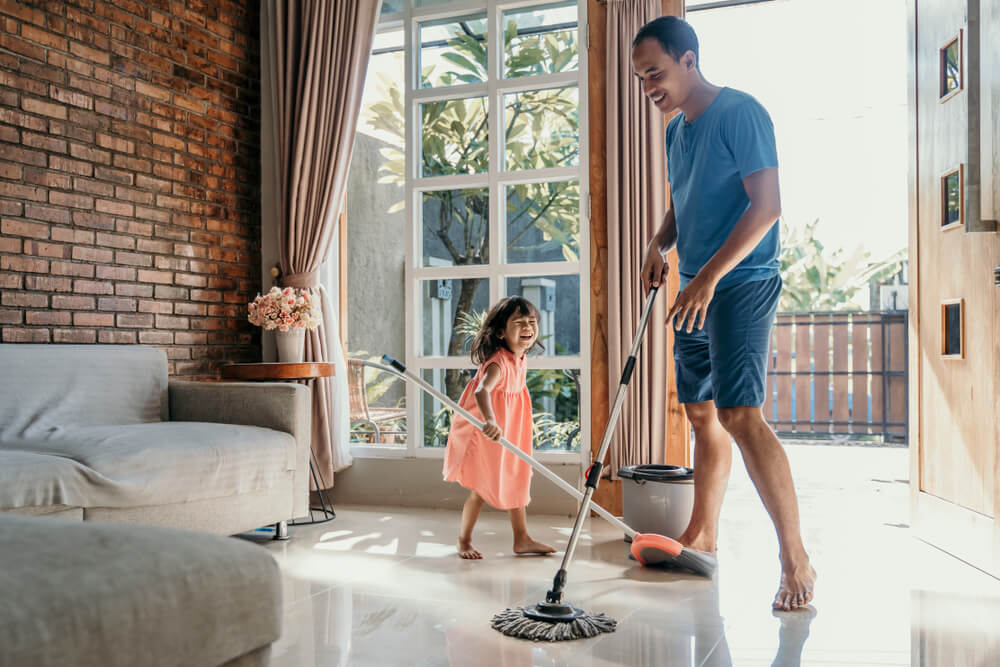
Teaching Family Chores Bit by Bit
Author Maggie Stevens shares her tips and tricks for teaching kids chores and encouraging participation. Maggie is the author of The Parent Fix which teaches parents how to change the way they react to their children in order to change their children’s reactions. Read along to learn how you can slowly incorporate chores into your child’s daily routine.
Start with Positivty
There is a never-ending list of items we should be teaching our children. We all understand the importance of teaching our children values such as honesty, compassion, and personal integrity. But our children also need to learn practical tasks like mowing the lawn or cleaning their bedroom. It is easy to give orders and demand our kids do what we say, but that is the best way to get an angry reaction.
As parents, we begin with the best intentions, but failure can seem amazingly imminent when our children refuse our requests. When our kids have daily chores they need to complete—or should I say, tasks we need them to accomplish—it does not have to be a negative experience. The question should not be “how do I force my children to help out around the house,” but rather, “how do we teach children responsibility in a positive way?”
The problem is not in our desire. The problem lies in our technique. You may be teaching the way your parents taught you and that never worked. When a child is not grasping what you are trying to teach, could it be that what you are trying to teach is too overwhelming for the child? Break tasks into small pieces.
Teach and Empower
Keep in mind that humans aren’t instinctively good at jobs such as laundry, vacuuming, and picking up clutter. We all need training. And no, having your kids and spouse watch you do chores doesn’t count as “training.” The human brain must be able to visualize the specifics of a certain task in order to complete it.
Even a mundane chore such as sweeping the kitchen floor requires a set of skills. Think about it. Sweeping involves breaking the floor into manageable squares, sweeping up little piles of dirt, and making those little piles travel onto the dustpan. Even teenagers don’t automatically know how to sweep a large room or organize a pile of junk and small children don’t necessarily perceive how to put away toys.
An important principle to use when teaching children is guided practice. Say you want to teach your child how to clean the bathroom. Begin by walking your child through the process step by step. Show her how to clean the toilet. Let her try it. Next move to the sink or the mirror. Do it with her using simple and easy directions.
Practice Makes Perfect
Remember that the first time she does the task on her own, it will probably not be up to your standards. There might be streaks on the mirror or stains around the toilet. Don’t ruin the teaching moment by dragging her back into the bathroom and criticizing her work. No matter how poor a job, begin by thanking her. (This will be difficult!) Choose another moment when you are both in the bathroom together and say, “Oh look, this mirror has a streak on it. It is tough to clean a mirror and not leave streaks.” Then clean the streaks from the mirror, explaining the process again with her watching. If you criticize your child’s work, you will never get her to do it again.
Baby Steps
The following steps can help you train those young brains:
- Break chores into 10-minute tasks. Label each task, such as cleaning a sink, sweeping the kitchen, or vacuuming one room.
- Assign every family member(or let them choose) a 10-minute chore each day. Post a detailed chart with each family members’ name next to their task.
The 10-minute task idea works well with children even as they grow into teens. Your children will see how teamwork adds up. Your positive reaction to their dedicated 10 minutes of hard work will keep them motivated. If a reward system works, use it!
Lead them, guide them, and be by their side when they need help. Don’t expect big things to happen. Be grateful for the small things because small things eventually add up to big things.
